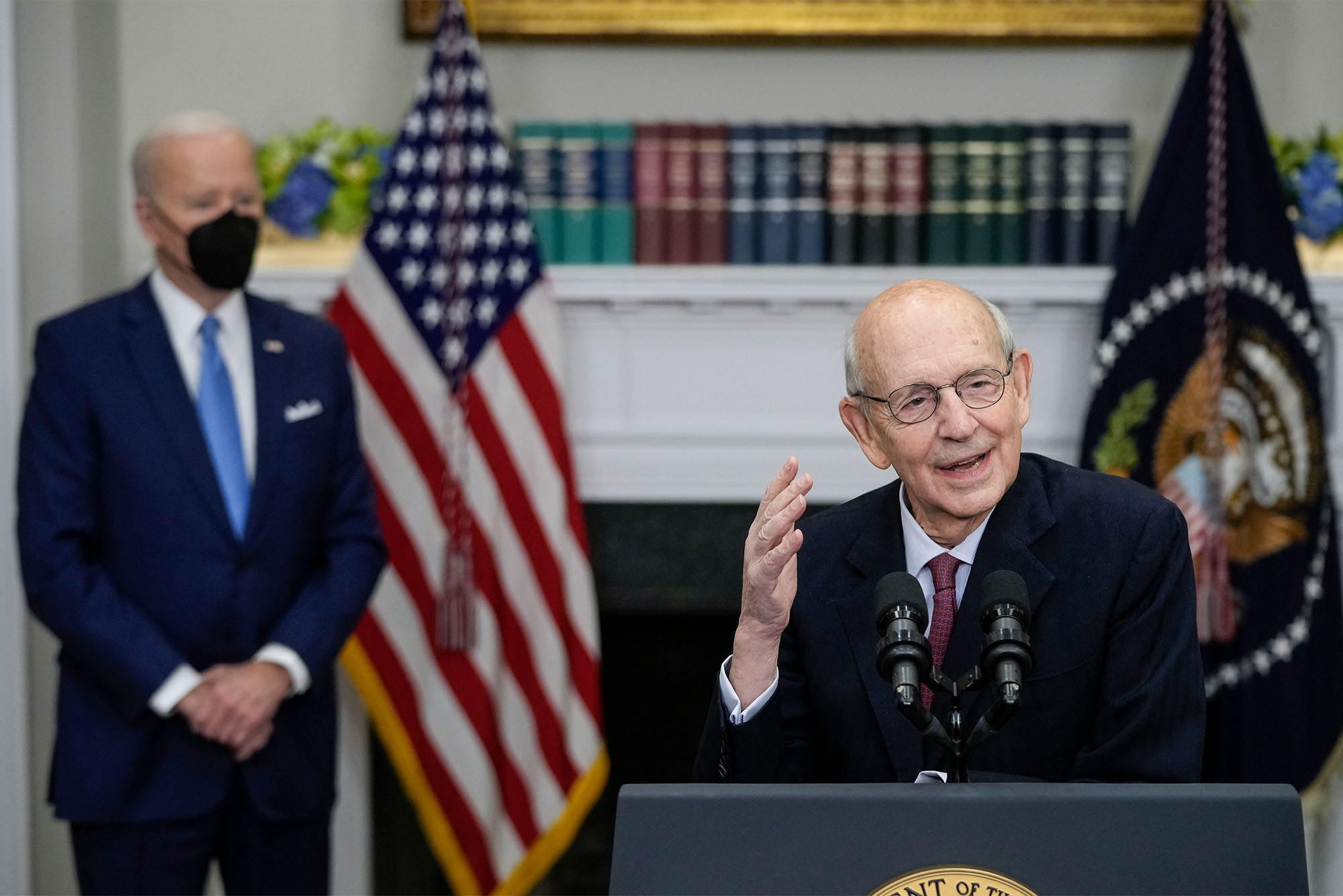Who Will Replace Stephen Breyer on SCOTUS?

Stephen Breyer (Hon.’95) announcing his retirement from the Supreme Court last week, with President Biden at left. Photo by Drew Angerer/Getty Images
Who Will Replace Stephen Breyer on SCOTUS?
LAW’s Jack Beermann on retiring justice’s legacy and the high court’s future
Stephen Breyer’s decision to come home to Cambridge after 28 years on the Supreme Court has thrilled progressives with the prospect of a first African American woman justice, promised by President Biden as his nominee later this month.
Breyer (Hon.’95), a former Harvard Law School professor, will retire this June, assuming the Senate has confirmed his successor, he announced last week. At 83, the oldest justice on the court and its “moderate liberal,” he voted against criminal defendants more than his fellow liberals, while being anti–death penalty and upholding Obamacare and LGBTQIA rights and always seeking consensus. His last months on the court will see it deliver consequential rulings, including whether to restrict or overturn abortion rights.
With a 6-3 conservative majority following the appointments of Neil Gorsuch, Brett Kavanaugh, and Amy Coney Barrett by former president Donald Trump, and with Biden’s social legislation stalled in Congress, Democrats are banking on a pathbreaking nominee who can deliver a political win.
BU Today asked Jack Beermann, a School of Law professor of law and Harry Elwood Warren Scholar, to assess Breyer’s legacy—and offer his prediction for a replacement.
Q&A
With Jack Beermann
BU Today: What was Stephen Breyer’s most important contribution to the court?
Jack Beermann: He was a reasonable, calm voice for a practical view of the law. He was a pragmatist. He wasn’t an ideologue. He didn’t take ideology or methodology as an impediment to trying to do the right thing. Any instinct that the court had for a practical view of the law, he was a leader of that, which is important. Justice [Elena] Kagan is similar.
He was a strong voice in favor of protecting voting and abortion rights. Those are areas where he made a big contribution to the liberal side of the court. But being in such a decided minority these days, he was in dissent a lot in recent years. He never was really the swing vote; he never had the importance of the chief justice [John Roberts]. There was only one issue he was the swing vote on; it’s a technical issue about the preemption of state laws by federal regulations, and he generally sided with the conservatives. That’s not one that’s a headline-grabber.
Most people don’t realize that he was, as a staffer for Ted Kennedy and an academic, a big advocate of deregulating regulated industries. He’s behaved exactly like what that history would predict. He doesn’t let ideology get in the way of doing what seems to be good for the country. His legacy as a justice is colored by his accomplishments before he was on the court.
BU Today: In terms of judicial philosophy, what kind of nominee should President Biden choose?
Jack Beermann: It’s unlikely that President Biden is going to choose someone in Breyer’s mold, because Breyer wasn’t an ideological liberal. In the current climate, we’re more likely to see a more strongly identified ideological nominee. If President Biden doesn’t appoint such a person, the liberal wing of the Democratic Party will go ballistic on him.
BU Today: Of the potential nominees reportedly under consideration, do you have a favorite?
Jack Beermann: I don’t necessarily have a favorite, but if I were handicapping this, I would put money on Ketanji Brown Jackson [a judge on the US Court of Appeals for the District of Columbia]. She’s well-respected, and she’s a distinguished judge. The Court of Appeals in Washington is probably the second most important court in the United States, because it gets most of the major appeals on government issues, the big cases on the powers of government agencies. She was also a clerk of Justice Breyer’s. My guess is Breyer is putting her name in Biden’s ear. She was a top law student at Harvard, which is where he taught. She’s absolutely got the résumé to be a very strong nominee.

BU Today: Biden’s choice—whoever it is—won’t move the court’s ideological needle, right?
Jack Beermann: No, it’s building for the distant future in that sense. Personally, would I prefer to have a more liberal court? Absolutely. Would I have preferred to have [now US attorney general and former SCOTUS nominee] Merrick Garland [nominated by President Obama in 2016] confirmed—not only because he went to the next high school from me and lived in the same area when I was growing up, but because he was a great judge and a great legal scholar? He was as qualified as they come.
BU Today: You said it was dirty pool [when Senate GOP leader] Mitch McConnell blocked Garland’s nomination. How do you expect Republican senators, who make up half the chamber, to deal with Biden’s nominee?
Jack Beermann: They will use it for rallying their base. For them, the best thing would be if Biden nominated the most identified liberal possible. They’re going to accuse this of being another move towards a socialist country. They’ll use it as a fundraising tool. Ultimately, they can’t stop it, because they abolished the filibuster on Supreme Court confirmations.
BU Today: McConnell is nothing if not creative in coming up with excuses why a nomination shouldn’t go forward. Is it in his interest to be so blatantly obstructionist?
Jack Beermann: I don’t know if he would if he could, but he can’t, so he won’t.
The thing that Democrats have to worry about is Joe Manchin [the moderate West Virginia Democratic senator]. If he’s against someone nominated, that could be a problem. There’ll be some more infrastructure money in West Virginia than there might have otherwise been.
Comments & Discussion
Boston University moderates comments to facilitate an informed, substantive, civil conversation. Abusive, profane, self-promotional, misleading, incoherent or off-topic comments will be rejected. Moderators are staffed during regular business hours (EST) and can only accept comments written in English. Statistics or facts must include a citation or a link to the citation.